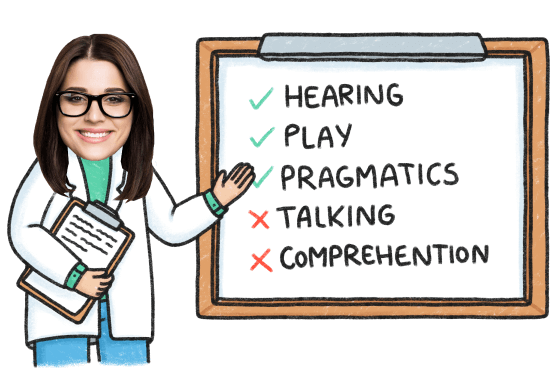Lack of Sleep: Is it Bad for My Child’s Speech Development?
Jan 15, 2022 We all know that sleep is vital for children of all ages and for adults. Recent studies have been diving into trying to determine HOW beneficial sleep is on various aspects of speech and language development.
Every parent worries about how much sleep their kids should get. The day-to-day issues of dealing with children and a lack of sleep become really obvious, but did you know that research on the impact of sleep in school-aged children suggests that even mild sleep loss results in noticeable deficits in their cognitive development and functioning? Cognitive development refers to the ability of our brains to learn through experience, thought, and the senses.
Not sleeping enough can affect children’s first stages of speech perception, which may contribute to disruptions in cognitive and linguistic functioning – skills they need for reading and language development and comprehension, according to recent research. The addition of sleep disorders makes it even worse.
At the University of Louisville, Rachel Waford’s child sleep study looked at kids between the ages of 6 and 7 while they listened to computer-generated speech sounds. The sounds included /ba/, /ga/, and /da/. “The results showed that those children not getting an adequate amount of sleep were more likely to phonetically code incorrectly different speech sounds.” This means that the manner in which they placed the sounds were incorrect.
Boost Your Child’s Speech Development!
Improve language & communication skills with fun learning!

“Our research has shown that even minor sleep loss of one hour less per night for seven nights contributes to disruptions in neurocognitive functioning,” said Waford. “The early school years are crucial windows that determine future learning. Therefore, children in this age range must be well-rested to prepare for the demands of the school day.”
This is very important research to acknowledge. I find that, even with my own kids, the more sleep they get, the better mood they are in the next day. They are also more able to follow directions and focus on adult-directed tasks.
So how much sleep is recommended? Experts recommend that “children in pre-school sleep between 11-13 hours a night, and school-aged children between 10-11 hours of sleep a night.”
Suggestions on How to Get Your Child to Sleep
If your child gives you a hard time about sleeping, there are several things you can try to make the process go smoother for them and for you!
- Set a schedule around sleep times. We do bath time at the same time every night. Then we read books to our kids before they go to sleep.
- Keep the room dark and at a comfortable temperature. Kids are sensitive to these sorts of things so keeping a nice temperature will help them sleep more soundly.
- Avoid foods or drinks that have too much caffeine. We have a rule in our house that once you brush your teeth before bed, you can only drink water for the night. Too much caffeine will lead to hyperactivity and silliness.
- Do not go to bed hungry, but don’t eat a big meal before bedtime, either.
- Kids should wake up around the same time every morning. This goes back to the whole schedule thing. Kids thrive on schedules! Keeping them regular is positive. There are times when that can’t happen, but every once in a while won’t hurt!
These handy, common-sense tips will mitigate language issues related to children and a lack of sleep and the resulting negative effects, and will also make your lives much easier to manage.
Have a question for our Speech Therapists?


Todler reciting ONLY A-b-c’s and one-two-three’s at 29 months. is it a major speech concern? Sleeps 10hours a day
Hi. Reciting ABC and Numbers is great, but we want to see more functional language at this age. For example, a child should be able to speak about 50 words and be putting words together. I would have your child evaluated by a speech-language pathologist.
Stacie Bennett, M.S. CCC-SLP